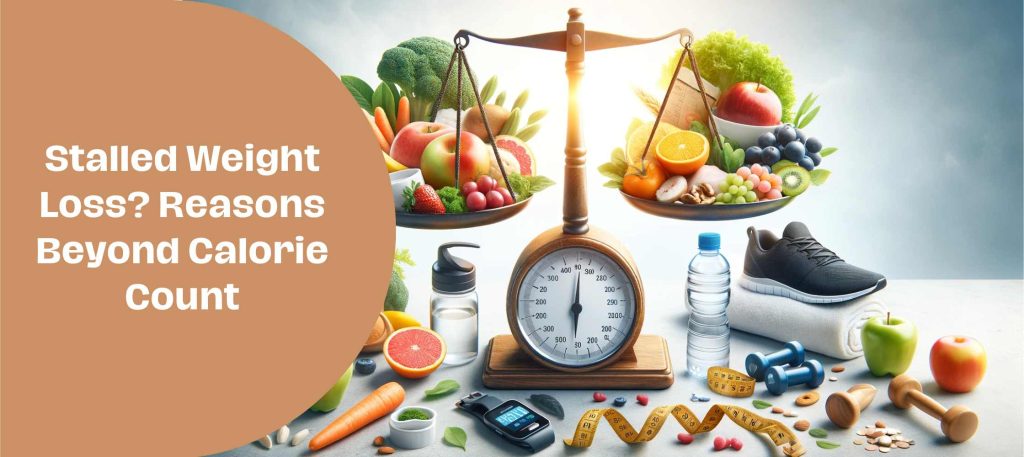|
Getting your Trinity Audio player ready...
|

Have you ever found yourself puzzled and a bit frustrated, asking, “Why am I not losing weight even though I’m eating fewer calories?” You’re not alone in this conundrum. This blog post is here to unravel this mystery. Together, we’ll explore why a calorie deficit doesn’t always translate to weight loss, and how factors like muscle gain, water weight, and sleep impact this journey.
Understanding Calorie Deficit
Calorie Deficit Explained: A calorie deficit occurs when you consume fewer calories than your body expends. It sounds simple, right? Burn more than you eat, and you’ll lose weight. However, the reality is more complex.
Misconceptions: One common myth is that all calories are equal. However, 100 calories of a sugary snack versus 100 calories of a nutrient-dense food like vegetables can have very different impacts on your body.
The Accuracy of Measurement: Underestimating calorie intake and overestimating calorie burn are common pitfalls. It’s crucial to accurately track both to ensure you’re truly in a calorie deficit.
Biological Factors
Metabolic Adaptation: Our bodies are incredibly adaptable. When you reduce calorie intake, the body can slow down the metabolism to conserve energy, making weight loss more challenging.
Hormonal Influences: Hormones like insulin, cortisol, and leptin play significant roles in appetite regulation, fat storage, and overall metabolism, affecting your weight loss efforts.
Genetic Factors: Our genetic makeup can influence how our bodies respond to diets and exercise, impacting our ability to lose weight.
Lifestyle and Behavioral Aspects
Physical Activity Levels: Exercise is crucial, but it’s not just about burning calories. It helps build muscle, which can weigh more than fat, leading to a confusing scenario where you’re getting healthier but not necessarily lighter.
Sleep and Stress: Inadequate sleep can lead to a reduction in fat loss and an increase in hunger, making weight loss harder. Stress, too, plays a role, potentially leading to overeating or poor food choices.
Eating Habits: It’s not just what you eat, but how and when. Mindless eating, emotional eating, and irregular eating patterns can all sabotage weight loss efforts.
Hidden Calories and Nutritional Factors
Imagine this: You’ve been diligently counting calories, yet the scale won’t budge. Frustrating, right? Well, sometimes, the devil is in the details – hidden calories. You might be unknowingly consuming more calories than you think. For instance, that morning latte or the dressing on your salad can add up quickly. And let’s talk about nutrient density versus caloric density. Foods rich in nutrients but low in calories, like fruits and vegetables, can be more satisfying and beneficial for weight loss than high-calorie, low-nutrient foods.
Psychological Elements
Picture yourself standing in front of the mirror, the numbers on the scale etched in your mind. Your relationship with your body and food plays a significant role in weight loss. It’s not just about what you eat; it’s also about why and how you eat. Emotional eating, for instance, can lead to consuming more calories than needed. And let’s not forget about the impact of stress and how it can lead us to seek comfort in food.
Practical Tips and Strategies
So, what can you do about it? First, consider fine-tuning your diet and exercise routine. Maybe add a bit more protein or switch up your workouts. And don’t hesitate to seek professional help if you’re stuck. A dietitian or a trainer can offer personalized advice. Most importantly, focus on making sustainable lifestyle changes rather than looking for quick fixes. Remember, it’s a marathon, not a sprint.
Conclusion
As we wrap up, remember that weight loss is a complex, multifaceted journey. It’s not just about calories in and calories out. It involves understanding your body, your habits, and making adjustments that work for you. So, be patient with yourself, keep exploring what works for your body, and stay committed to your health journey. What’s the one change you’ll make today to move a step closer to your goals? Share your thoughts, experiences, or questions below – let’s embark on this journey together!
- Laser Hair Removal Costs in the US – Complete Guide - April 13, 2024
- Quinoa for Weight Loss – Effective Tips & Healthy Recipes - April 1, 2024
- WW Sequence Reviews – In-Depth Weight Loss Program Analysis - March 30, 2024
